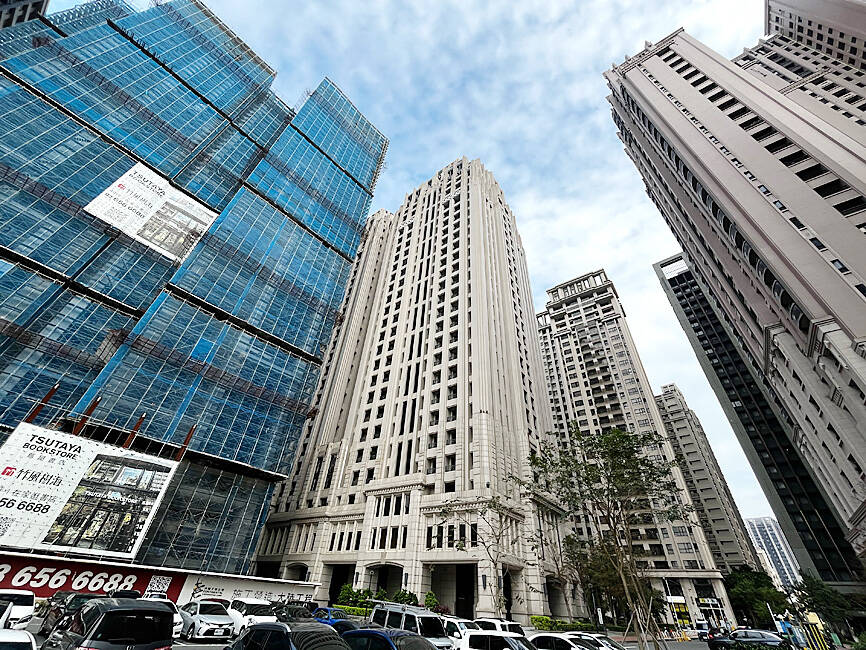House prices in Taiwan might drop by double-digit percentage points next year, with correction pressures more evident in areas with heavy supply, Evertrust Rehouse Co (永慶房屋) said yesterday.
Prices are likely to fall by 7 to 10 percent in areas with real demand, but the decline would reach 10 to 15 percent in places where property speculation underpins transactions, Evertrust Rehouse general manager Yeh Ling-chi (葉凌棋) told a news conference in Taipei, citing an internal survey and data from more than 1,800 of its outlets nationwide.
Only 33 percent of respondents expect house prices to increase in the next three months, a plunge from 55 percent three months earlier, the company said.

Photo: Hsu Yi-ping, Taipei Times
After the central bank in September introduced a new wave of credit controls to induce a soft landing in the market, prices this quarter fell by between 1.6 percent and 4.5 percent in Taiwan’s six special municipalities, as well as Hsinchu county and city, Yeh said.
The downturn was also linked to higher interest rates, the survey showed.
Interest rates start at 3 percent for non-first homes as local lenders seek to slow real-estate lending, but buyers said that an interest rate of 2.75 percent would pose an unbearable financial burden, the survey showed.
Close to 65 percent of prospective buyers said that credit tightening affected their purchase decisions, while 68 percent expressed a need for a mortgage equivalent to 70 percent of their home’s value, Evertrust research manager Daniel Chen (陳賜傑) said.
Credit controls cap loan-to-value ratios of 50 percent for second houses, and the terms are even more unfavorable for third and fourth homes across Taiwan.
In addition, non-first homes are denied grace periods.
Against that backdrop, Evertrust expects house transactions next year to shrink 18 to 21 percent to 278,000 to 288,000 units, from an advance of 13 to 16 percent to 347,000 to 355,000 units this year, Yeh said.
“Corrections in the market look inevitable,” Yeh said, adding that selling pressure would intensify.
The number of homes for sale rose 17.4 percent in the second half of this year from the first half, he said.
The company also expects about 146,436 new houses to enter the market in next three years, which would sharpen selling pressure and concentration of real-estate lending, Yeh said.
The central bank would not show leniency anytime soon and sellers who intend to pull out had better make greater price concessions, he said, suggesting that a 10 percent or deeper concession would motivate buyers.

United Microelectronics Corp (UMC, 聯電) expects its addressable market to grow by a low single-digit percentage this year, lower than the overall foundry industry’s 15 percent expansion and the global semiconductor industry’s 10 percent growth, the contract chipmaker said yesterday after reporting the worst profit in four-and-a-half years in the fourth quarter of last year. Growth would be fueled by demand for artificial intelligence (AI) servers, a moderate recovery in consumer electronics and an increase in semiconductor content, UMC said. “UMC’s goal is to outgrow our addressable market while maintaining our structural profitability,” UMC copresident Jason Wang (王石) told an online earnings

Gudeng Precision Industrial Co (家登精密), the sole extreme ultraviolet (EUV) pod supplier to Taiwan Semiconductor Manufacturing Co (TSMC, 台積電), is aiming to expand revenue to NT$10 billion (US$304.8 million) this year, as it expects the artificial intelligence (AI) boom to drive demand for wafer delivery pods and pods used in advanced packaging technology. That suggests the firm’s revenue could grow as much as 53 percent this year, after it posted a 28.91 percent increase to NT$6.55 billion last year, exceeding its 20 percent growth target. “We usually set an aggressive target internally to drive further growth. This year, our target is to

The TAIEX ended the Year of the Dragon yesterday up about 30 percent, led by contract chipmaker Taiwan Semiconductor Manufacturing Co (TSMC, 台積電). The benchmark index closed up 225.40 points, or 0.97 percent, at 23,525.41 on the last trading session of the Year of the Dragon before the Lunar New Year holiday ushers in the Year of the Snake. During the Year of the Dragon, the TAIEX rose 5,429.34 points, the highest ever, while the 30 percent increase in the year was the second-highest behind only a 30.84 percent gain in the Year of the Rat from Jan. 25, 2020, to Feb.

Cryptocurrencies gave a lukewarm reception to US President Donald Trump’s first policy moves on digital assets, notching small gains after he commissioned a report on regulation and a crypto reserve. Bitcoin has been broadly steady since Trump took office on Monday and was trading at about US$105,000 yesterday as some of the euphoria around a hoped-for revolution in cryptocurrency regulation ebbed. Smaller cryptocurrency ether has likewise had a fairly steady week, although was up 5 percent in the Asia day to US$3,420. Bitcoin had been one of the most spectacular “Trump trades” in financial markets, gaining 50 percent to break above US$100,000 and